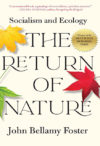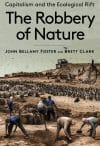
Financialized Capitalism, COVID-19, and the Great Divide
Although the current crisis of production associated with the COVID-19 pandemic has sharpened disparities, the overall problem is much longer and more deep-seated, a manifestation of the inner contradictions of monopoly-finance capital. Comprehending the basic parameters of today’s financialized capitalist system is the key to understanding the contemporary contagion of capital, a corrupting and corrosive cash nexus that is spreading to all corners of the U.S. economy, the globe, and every aspect of human existence. | more…

In an interview with Alejandro Pedregal, John Bellamy Foster tells us about the paths great ecosocialist thinkers traveled, the most prominent debates in current Marxist ecological thought, and the urgent need for a project that transcends the conditions that threaten the existence of our planet today. | more…

Today, two hundred years after his birth, Frederick Engels can be seen as one of the foundational ecological thinkers of modern times. Engels’s contributions to our understanding of the overall ecological problem remain indispensable, rooted in his own deep inquiries into nature’s universal metabolism. It is because of the very comprehensiveness of his approach to the dialectic of nature and society that Engels’s work can help clarify the momentous challenges facing humanity in the Anthropocene epoch and the current age of planetary ecological crisis. | more…

In the twenty-first century, all signs are pointing to another period of hegemonic struggle over the world economy, this time between the United States and China, although complicated in this case by the unique, indeterminate aspects of the post-revolutionary Chinese social formation, which is neither entirely capitalist nor entirely socialist. | more…

Any serious treatment of the renewal of socialism today must begin with capitalism’s creative destruction of the bases of all social existence. Since the late 1980s, the world has been engulfed in an epoch of catastrophe capitalism, manifested today in the convergence of (1) the planetary ecological crisis, (2) the global epidemiological crisis, and (3) the unending world economic crisis. Added to this are the main features of today’s “empire of chaos,” including the extreme system of imperialist exploitation unleashed by global commodity chains; the demise of the relatively stable liberal-democratic state with the rise of neoliberalism and neofascism; and the emergence of a new age of global hegemonic instability accompanied by increased dangers of unlimited war. | more…

The rise to prominence of analyses of racial capitalism represents a breakthrough in Marxian theory. This has necessarily been accompanied by a critique of previous Marxian analyses, which all too often ignored or minimized the relation of slavery to capitalism. In recent years, however, these criticisms of orthodox Marxist treatments of slavery have been extended, much more problematically, to the work of Karl Marx himself. Although Marx never wrote a treatise on slavery, the issue of slave labor was woven into his analysis of social formations, both ancient and modern, and was inextricably intertwined with his treatment of wage labor. | more…

Commodity Chains and Ecological-Epidemiological-Economic Crises
Since the late twentieth century, capitalist globalization has increasingly adopted the form of interlinked commodity chains controlled by multinational corporations, connecting various production zones, primarily in the Global South, with the apex of world consumption, finance, and accumulation primarily in the Global North. COVID-19 has accentuated as never before the interlinked ecological, epidemiological, and economic vulnerabilities imposed by capitalism. | more…

Twenty years ago, John Bellamy Foster’s Marx’s Ecology: Materialism and Nature introduced a new understanding of Karl Marx’s revolutionary ecological materialism. More than simply a study of Marx, it commenced an intellectual and social history, encompassing thinkers from Epicurus to Darwin, who developed materialist and ecological ideas. Now, with The Return of Nature: Socialism and Ecology, Foster continues this narrative. In so doing, he uncovers a long history of efforts to unite issues of social justice and environmental sustainability that will help us comprehend and counter today’s unprecedented planetary emergencies. | more…

Karl Marx’s (and Frederick Engels’s) analysis of nineteenth-century Irish history revealed what is referred to as “the rift of Éire” in the colonial period. Indeed, it is in relation to the analysis of the systematic disruption of the Irish environment that Marx’s ecological inquiries can be seen as taking on a concrete and developed form, encompassing the ecological as well as economic robbery that characterized the Irish colonial regime. | more…

In the nineteenth century, Karl Marx, inspired by the German chemist Justus von Liebig, argued that capitalism’s relation to its natural environment was that of a robbery system, leading to an irreparable rift in the metabolism between humanity and nature. In the twenty-first century, these classical insights into capitalism’s degradation of the earth have become the basis of extraordinary advances in critical theory and practice associated with contemporary ecosocialism. In The Robbery of Nature, John Bellamy Foster and Brett Clark, working within this historical tradition, examine capitalism’s plundering of nature via commodity production, and how it has led to the current anthropogenic rift in the Earth System. | more…

The “turn toward the indigenous” in social theory in the last couple of decades, associated with the critique of white settler colonialism, has reintroduced themes long present in Marxian theory, but in ways that are often surprisingly divorced from Karl Marx’s critique of capitalism, colonialism, and imperialism. | more…

The Expropriation of Land, Labor, and Corporeal Life
Historical capitalism cannot be understood aside from its existence as a colonial/imperialist world system in which the violent exercise of power is an ever-present reality. In order to uncover the material conditions governing concrete capitalism, including its interface with land, nonwage labor, and corporeal life, it is therefore necessary to go beyond the inner reality of exploitation, and address expropriation, or the process of appropriation without equivalent (or without reciprocity) through which capital has sought to determine its wider parameters. | more…

We are seeing today what appear to be the beginnings of an ecological revolution, a new historical moment unlike any humanity has experienced. Not only is the planet burning, but a revolutionary climate movement is rising up and is now on fire in response. | more…












